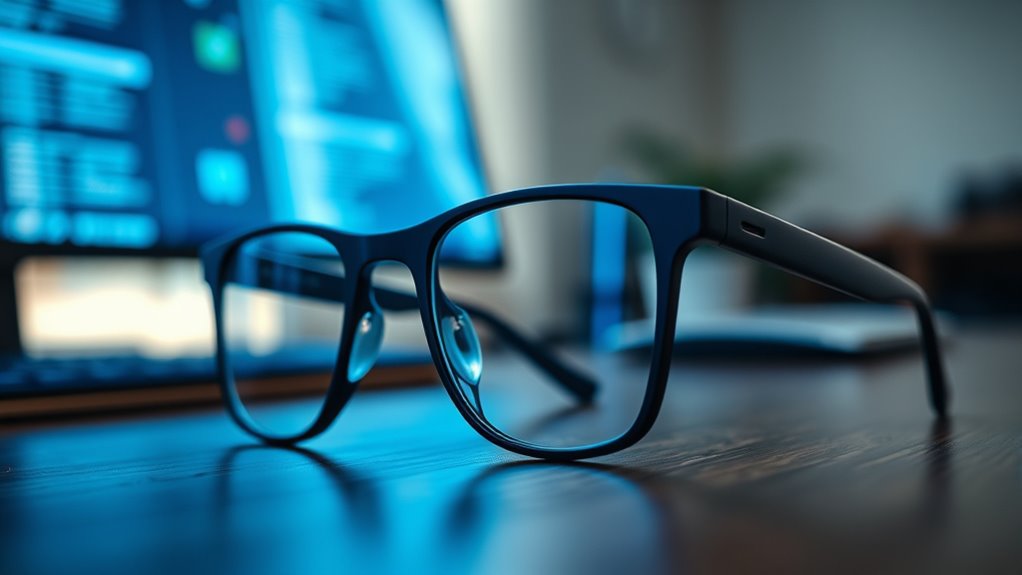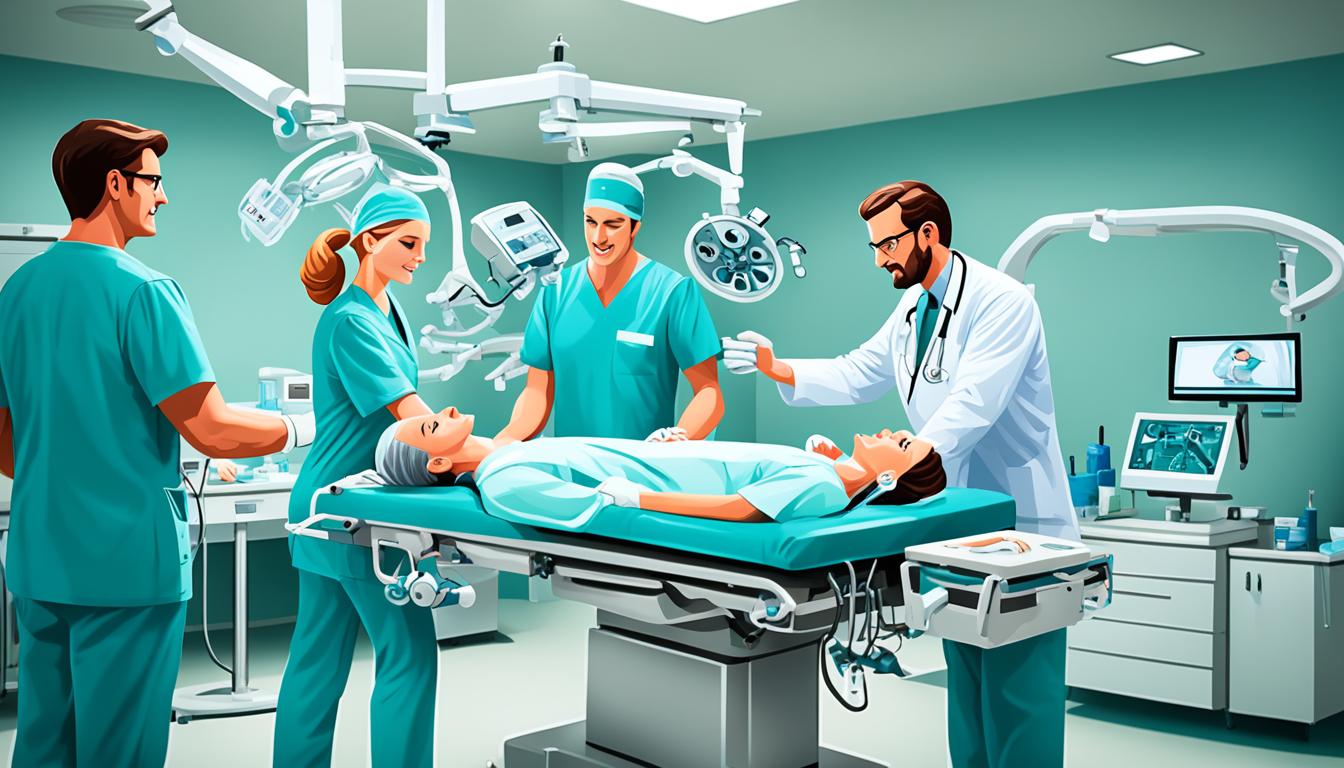Peer-reviewed research shows that blue light glasses may help some people, especially after long screen use, but their overall ability to reduce digital eye strain isn’t proven. Many studies find their benefits are overstated and vary among users. While they might offer some relief, ergonomic habits like proper screen distance and breaks are far more effective. If you’re curious about what truly helps, keep exploring the facts behind blue light eyewear.
Key Takeaways
- Peer-reviewed studies show mixed evidence on blue light glasses reducing digital eye strain.
- Blue light filters target specific wavelengths but are not proven to prevent eye fatigue universally.
- Ergonomic practices and regular breaks are more effective than relying solely on blue light glasses.
- Some users experience discomfort or color distortion from extended use of blue light blocking glasses.
- Overall, blue light glasses may help sensitive individuals but are not a guaranteed solution for eye strain.

Many people turn to blue light glasses, hoping they’ll reduce eye strain caused by screens, but the truth isn’t as clear-cut as it seems. While these glasses are marketed as a solution to digital eye fatigue, their actual benefits are subject to ongoing research. One area that’s gaining attention is the ergonomic benefits that come with wearing blue light glasses. Proper ergonomics—such as maintaining an appropriate screen distance, adjusting lighting, and taking regular breaks—are proven to help prevent eye strain. Blue light glasses might complement these practices, but they shouldn’t replace good ergonomic habits. If you’re looking to minimize eye discomfort, focusing on your overall workspace setup, including chair height and screen position, is often more effective than relying solely on specialized eyewear.
When it comes to eye strain prevention, peer-reviewed studies show mixed results. Some research suggests that wearing blue light glasses can reduce discomfort, especially in individuals who spend long hours in front of screens. These glasses are designed to filter out specific wavelengths of blue light that are believed to contribute to eye fatigue. However, other studies indicate that blue light isn’t the primary cause of digital eye strain. Instead, symptoms like dryness, blurred vision, and headaches are often linked to reduced blinking and prolonged screen time. This means that blue light glasses might not offer a significant advantage over simply following the 20-20-20 rule: every 20 minutes, look at something 20 feet away for at least 20 seconds.
Moreover, peer-reviewed research emphasizes that eye strain prevention hinges on multiple factors. Proper lighting, screen brightness adjustments, regular breaks, and blinking exercises play essential roles. Blue light glasses might provide some relief for sensitive individuals, but they shouldn’t be considered a cure-all. It’s also worth noting that some glasses marketed for blue light blocking may distort color perception or cause discomfort over extended wear, which can negate their ergonomic benefits. Additionally, understanding the contrast ratio of your display can help determine how well your screen reproduces dark and bright details, influencing overall eye comfort during prolonged viewing sessions.
Frequently Asked Questions
Are Blue Light Glasses Effective for Reducing Eye Strain?
You might wonder if blue light glasses really help with eye strain. They work by blocking blue light filters, which can reduce eye fatigue caused by prolonged screen time. Many users find that wearing these glasses lessens discomfort and helps them focus longer without tiring their eyes. While individual results vary, blue light glasses are a simple option that can make a noticeable difference in managing eye fatigue during extended screen use.
Can Blue Light Glasses Improve Sleep Quality?
Think of blue light exposure as a conductor that can throw your sleep cycle offbeat. Wearing blue light glasses may help, as they filter out blue light and support sleep cycle regulation. By reducing blue light exposure before bed, you might find it easier to fall asleep and enjoy better sleep quality. While not a magic wand, these glasses can be part of your sleep-friendly routine.
Do Blue Light Glasses Protect Against Long-Term Eye Damage?
You wonder if blue light glasses can protect your eyes from long-term damage. While they mainly offer blue light filtering, some also provide UV protection, which helps guard against harmful ultraviolet rays. These features may reduce eye strain and potential damage over time. However, keep in mind that current research is limited, so wearing blue light glasses with UV protection can be a proactive step, but isn’t a guaranteed safeguard against long-term eye harm.
Are Blue Light Glasses Necessary for All Digital Device Users?
Imagine blue light glasses as fashionable shields in a digital battlefield. While they’ve become trendy, not everyone needs them like a must-have fashion statement. If you spend hours in front of screens, they might help reduce eye strain, but aren’t essential for all device users. Consider the cost and your habits before jumping on the trend—sometimes, simple breaks and good screen habits do more.
How Do Blue Light Glasses Compare to Screen Time Management?
You might wonder how blue light glasses compare to managing your screen time. Blue light coverage helps reduce eye strain and improve sleep, but it’s not a substitute for limiting screen exposure. While they add fashion appeal, they shouldn’t replace healthy habits like taking breaks. Combining both strategies offers better eye protection, ensuring you manage screen time effectively while benefiting from the stylish blue light glasses.
Conclusion
Ultimately, blue light glasses are like a lighthouse guiding you through the fog of digital screens. They may not be a magic wand, but they help you navigate your daily voyage more comfortably. As you wear them, think of protecting your eyes as safeguarding a precious lantern—your vision’s beacon. Embrace the clarity they offer, and let your eyes shine bright, unburdened by unnecessary shadows. Your journey to healthier sight starts with a simple, mindful choice.








